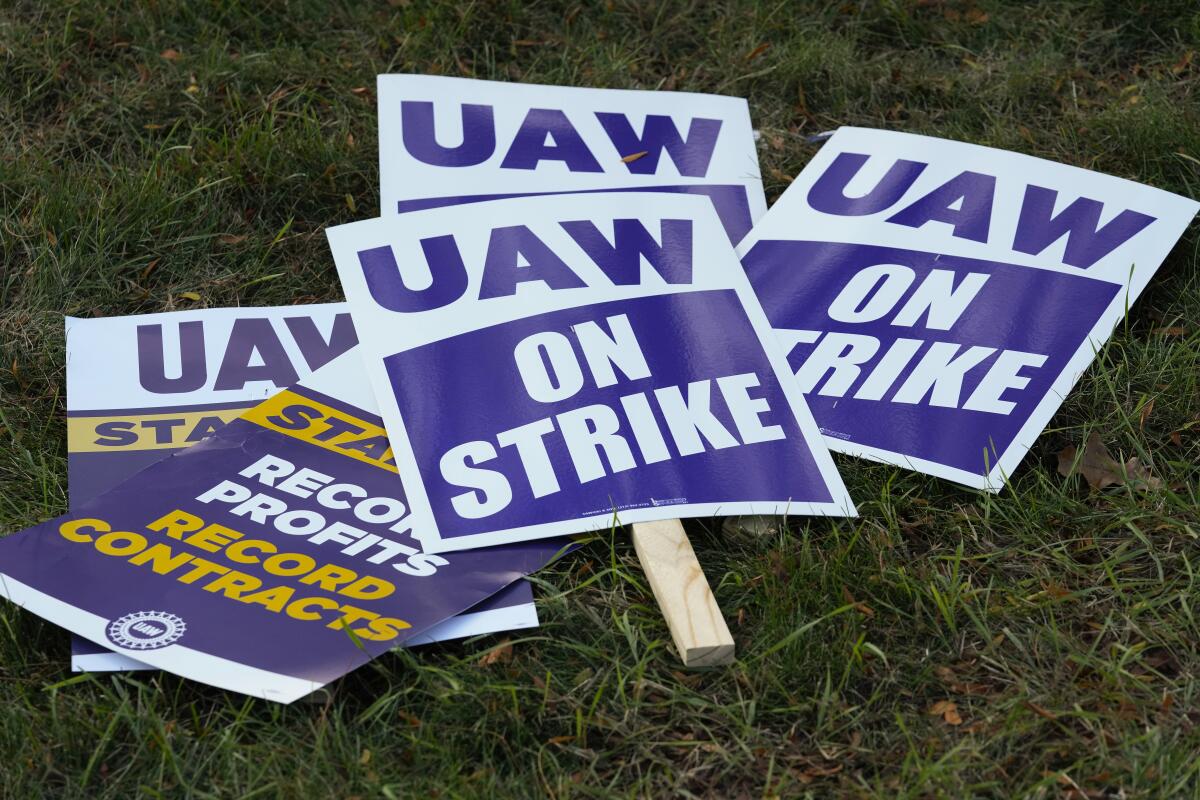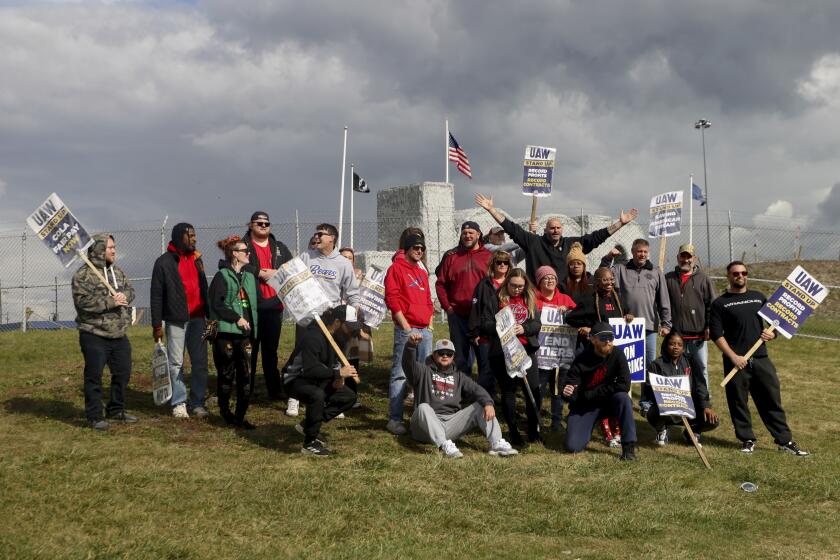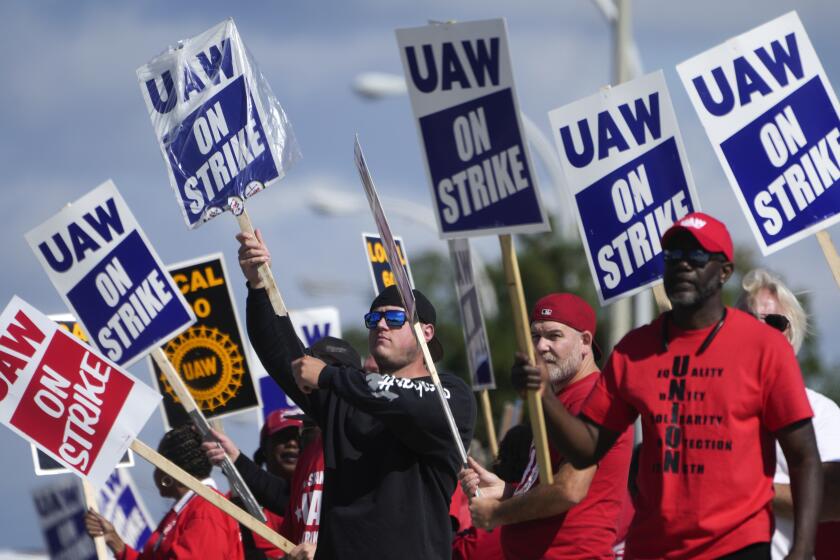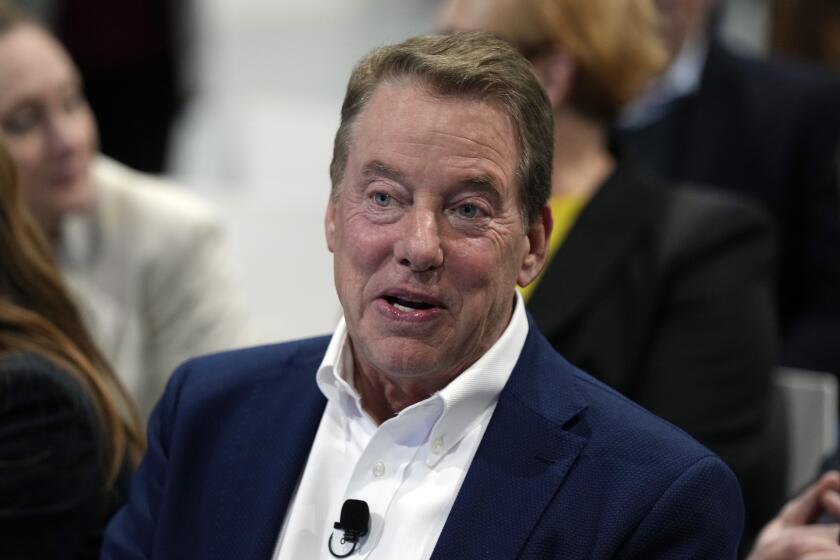UAW strikes at GM’s SUV plant in Texas as union begins to target automakers’ cash cows

- Share via
First it was Ford, then Stellantis, and now a General Motors factory has been added to the growing list of highly profitable plants where the United Auto Workers union is on strike.
On Tuesday, about 5,000 workers walked out at GM’s factory in Arlington, Texas, that makes big, high-margin SUVs such as the Chevrolet Tahoe and Cadillac Escalade.
The strikes in Texas, as well as at the largest Ford factory in the world in Louisville, Ky., and a Stellantis plant that makes lucrative Ram pickups in Michigan, are aimed at getting the companies to capitulate to union demands for richer wages and benefits than the automakers so far have offered.
But judging from statements out of Detroit, the companies are at or near the limit on how much they’re willing to budge to end a series of targeted strikes now involving 46,000 workers that began on Sept. 15. About 32% of the union’s 146,000 members at the companies are on strike, and the automakers are laying off workers at other plants as parts shortages cascade through their systems.
In announcing the Arlington strike, UAW President Shawn Fain noted that GM posted big earnings on Tuesday, yet its offer to the union lags behind Ford’s, preserving a two-tier wage structure and offering the weakest 401(k) contribution of all three automakers.
UAW has once again escalated its strikes against Detroit Three automakers, this time adding a factory that makes Ram pickup trucks for Stellantis.
“It’s time GM workers, and the whole working class, get their fair share,” Fain said.
But GM Chief Executive Mary Barra told investors on the company’s earnings conference call that the automaker already has made a record offer and won’t sign a contract that jeopardizes the company’s future.
“We will not agree to a contract that isn’t responsible for our employees and for our shareholders,” she said. “We need to make sure we have a contract that is going to allow us to compete and win in what is a challenging market for EVs and also allows us to support the business that we have with strong margins in our [internal combustion engine] business.”
Last week, Ford told reporters that it had reached the limit of what it was willing to pay to end the nearly 6-week-old strike, bringing out Executive Chairman Bill Ford to urge strikers to return to work. On Monday, after the union took down the pickup plant in Sterling Heights, Mich., north of Detroit, Stellantis said it was “outraged” by the escalation because it had improved its offer to include a 23% wage increase over four years.
All three automakers have said they won’t stick themselves with high labor costs that would make their vehicles more costly than nonunion competitors’.
The money automakers spent on stock buybacks to raise shareholder profits, rather than on wages or investments in a green future, helps explain why workers are stepping up the pressure.
Talks continued Tuesday with Stellantis and Ford, with new offers from the union either coming or delivered at both companies. The status of talks with GM wasn’t clear.
Early on, the union struck at plants that didn’t make the companies’ most expensive and profitable vehicles. But as the strikes dragged on, Fain has targeted truck and SUV plants in an effort to turn up the financial pressure.
At the same time, workers are getting by on $500 per week of strike pay, hardly enough to pay the monthly bills. The payments also are making a dent in the union’s strike fund, which had $825 million when the strikes began. Fain said it was still healthy.
Thomas Kochan, a professor of work and employment at MIT, said adding the GM SUV plant means the negotiations are at a pivotal point.
“The pressures for reaching an agreement that everybody can live with are immense on both the company and the union,” he said. “The effects of an expanded strike across the three companies and prolonged over time would be profound, and would have very serious negative effects on the companies and on the workforce.”
Ford Executive Chair Bill Ford calls on autoworkers to end strike, says company’s future is at stake
Ford Motor Co.’s Bill Ford called on autoworkers to unite and end a strike that he says could cost the company the ability to invest in the future.
The companies, he said, are close to the limits on their offers and the union is close to what it legitimately can expect to get.
“There comes a time where the parties have to have very private conversations in negotiations,” Kochan said. “It’s time for the public rhetoric to stop.”
On the picket line in Texas, Ethan Pierce, a material handler with more than 23 years at GM, said workers sacrificed, making concessions to help save GM when it was in dire financial trouble around the 2008 financial crisis. “We started asking for some of our stuff back. They didn’t want to give it to us,” Pierce said.
Now, with inflation driving up prices, workers are struggling, he said. Among the sticking points is GM’s refusal to let workers go on strike over plans to close factories, Pierce said.
“If you’re being treated unfairly, sooner or later you have to stand up,” he said. “When we get treated better, everybody else gets treated better.”
The addition of the Arlington plant came just after GM announced strong third-quarter financial results. The SUVs are among GM’s most profitable vehicles.
The company on Tuesday posted a net profit of just over $3 billion for the quarter, down 7% from a year ago. But it reported strong demand and prices for its vehicles.
GM later said that it’s disappointed by the escalation at Arlington, calling the strike “unnecessary and irresponsible,” and said it will have negative ripple effects on dealers, suppliers and communities.
Because the striking plants supply or get parts from other factories, the automakers say they’ve been forced to lay off an additional 7,672 workers. And shares of General Motors Co. are down more than 14% this year, touching lows Tuesday that haven’t been seen since 2020 during the pandemic, when the company’s sales growth tumbled almost 11%.
Last week GM made an offer that surpassed its previous one by about 25% in total value, the company said.
Barra said GM has made a record offer to the union that will raise top factory pay to $40.39 per hour, or roughly $84,000 per year, in four years.
The company also said the strike is expected to cut pretax earnings by $800 million this year. And that estimate was made prior to the Arlington strike, GM said.
More to Read
Inside the business of entertainment
The Wide Shot brings you news, analysis and insights on everything from streaming wars to production — and what it all means for the future.
You may occasionally receive promotional content from the Los Angeles Times.













